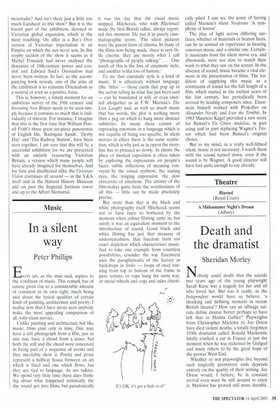Music
In a silent way
Peter Phillips
Every art, as the man said, aspires to the condition of music. This remark has of course given rise to a considerable amount of comment in its own right, much being said about the lyrical qualities of certain kinds of painting, architecture and poetry. I realise now that I have never seen anybody make the most appealing comparison of all, with silent movies.
Unlike painting and architecture but like music, films exist only in time. One may have a still photograph from a film, just as one may have a chord from a score, but both the still and the chord were conceived as being part of a sequence of events and they inevitably show it. Poetry and prose represent a halfway house between an art which is fixed and one which flows, but they are tied to language. As are talkies. We spend very little time these days thinking about what happened artistically the day sound got into films, but paradoxically
it was the day that the visual music stopped. Hitchcock, who with Blackmail made the first British talkie, always regretted this moment. He put it in purely cinematographic terms; 'The silent pictures were the purest form of cinema. In many of the films now being made, there is very little cinema: they are mostly what I call "photographs of people talking" . . . One result of this is the loss of cinematic style, and another is the loss of fantasy.'
To me that cinematic style is a kind of music, It is effectively without language (the 'titles' — those cards that pop up in the action telling us what has just been said — can be translated at will, or even omitted altogether as in F.W. Murnau's The Last Laugh) and, as with so much music that has words, the plot is nothing more than a peg on which to hang more abstract subtleties. In music these consist of expressing emotions in a language which is not capable of being too specific. In silent movies in effect there is the same restriction, which is why just as in opera the storyline has to proceed so slowly. In silents the place of musical exposition is often taken by exploring the expressions on people's faces: subtle inflections of meaning conveyed by the raised eyebrow, the staring eyes, the longing expression, the slow crescendo of emotions. The artistry of the film-maker gains from the wordlessness of all this — little can be made absolutely precise.
But more than that is the black and white photography itself. Hitchcock seems not to have been so bothered by the moment when colour filming came in, but surely it was an equivalent moment to the introduction of sound. Good black and white filming has just that measure of understatedness. that freedom from too exact depiction which characterises music. Just to take one example from countless possibilities, consider the way Eisenstein uses the paraphernalia of the factory as backdrops in Strike — loops of steel running from top to bottom of the frame in pure texture, or rope hung the same way, or metal wheels and cogs and axles chaoti cally piled. I can see the point of having called Murnau's silent Nosferatu 'A symphony of horror'.
The play of light across differing surfaces, whether of materials or human faces, can be as sensual an experience as hearing sonorous music, and a similar one. Certainly musicians from the silent movie era, and afterwards, were not slow to match their work to what they saw on the screen. In the absence of sound, music became a vital element in the presentation of films. The tradition of supplying this music as a continuum of sound for the full length of a film, which started in the earliest years of the last century, has periodically been revived by leading composers since. Eisenstein himself worked with Prokofiev on Alexander Nevsky and Ivan the Terrible. In 1983 Mauricio Kagel provided a new score for Bunuel's Un Chien Andalou, in part using and in part replacing Wagner's Tristan which had been Bunuel's original choice.
But to my mind, in a really well-filmed silent, music is not necessary. I watch them with the sound turned down, even if the sound is by Wagner. A good director will have had quite enough to say already.


























































 Previous page
Previous page